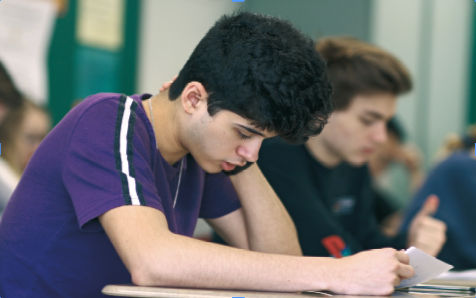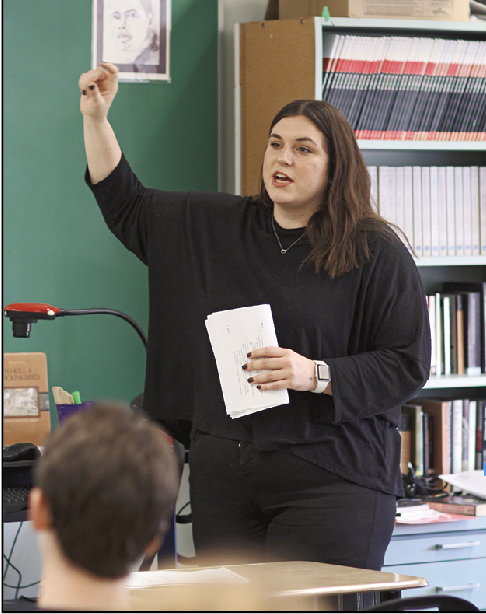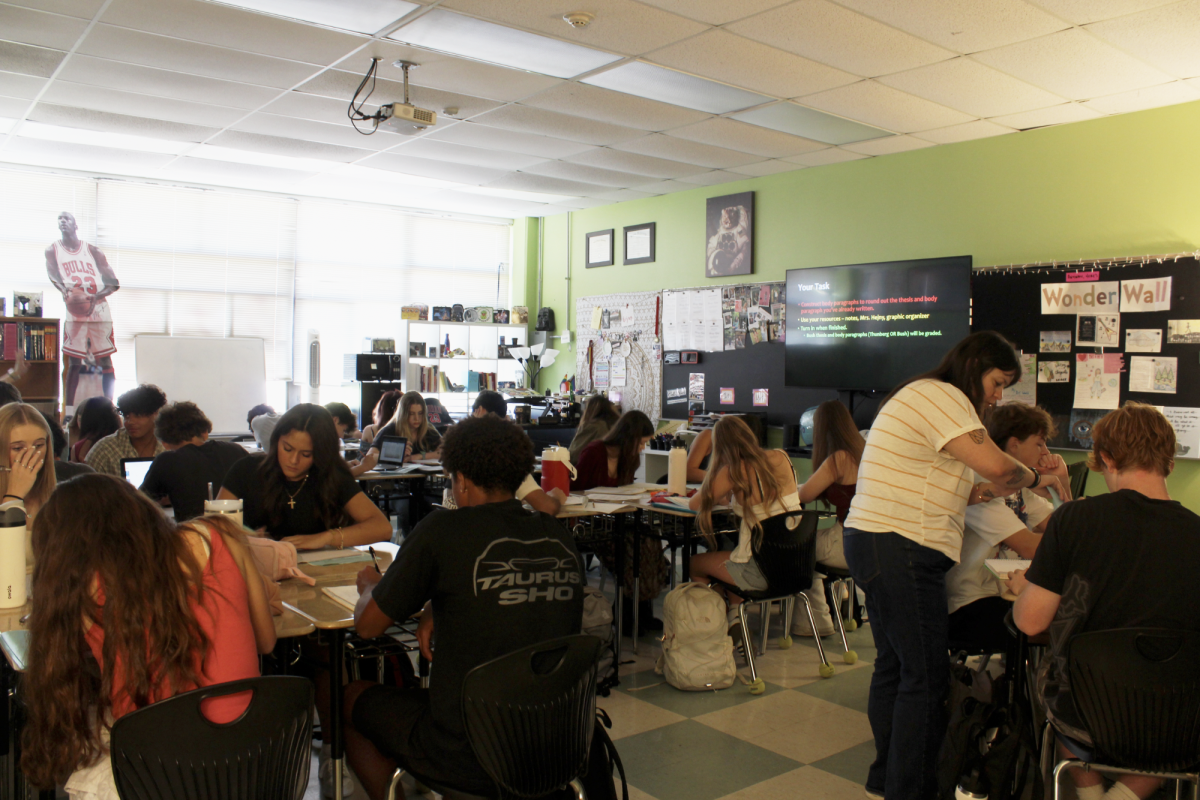Learning film-making in the real world
THE NEED-TO-KNOWS: Austin Film Festival Director Olivia Riordan goes over the guidelines of a short film with the creative writing class. Riordan was helping the students become familiar with important details when filming.
May 13, 2019
The sound of papers flipping fills the room as students follow along, reading a script for a short film. Austin Film Festival (AFF) director Olivia Riordan directs the class in processing the various writing techniques in screen-writing.
Since early March, creative writing classes partnered with the AFF to learn about screen-writing. Students will have the opportunity to write their own short film and compete against three classes of students to have their film shot.
“By the end of this semester, we’ll shoot one of [the short films], so first of all it just teaches you that craft,” Riordan said. “On another level, [screen-writing] just teaches you about how to express your creativity and how to communicate that with others in sort of a different way, as well as practical reading and writing skills that can apply to a lot of storytelling mediums.”
Senior Coby Smith is thinking about pursuing a future in the film industry and enjoys learning from Riordan.
“So far we’ve been learning about simple things like elevator pitches and stuff like trying to get your ideas pitched,” Smith said. “Before you pitch an idea, you need to fully understand and be able to answer questions about your film, like what kind of world it’s gonna be in and aspects like that.”
Although other schools in the district have previously worked with the AFF, this is the first year that the Young Filmmakers program is being offered at Bowie. The curriculum was built through the efforts of several past directors to create a curriculum that aligned with Texas Essential Knowledge Skills (TEKS).
“The core of [the curriculum] is that it will work for teachers and that it will work for multiple mediums because while we’re a film festival, our focus is storytelling no matter what medium you end up choosing,” Riordan said. “So we’re trying to find and hit on things that [students] can apply to any of their creative endeavors.”
Previously, creative writing teacher Bree Rolfe taught the screen-writing unit as part of a drama unit. Despite her experience in college with short films, she feels the resources brought by the AFF will be valuable for students.

GETTING THE READ ON: Junior Max Pelayo reads aloud through a script in his creative writing class. Students will be creating their own short films scripts and one will be chosen to be filmed by the end of the semester.
“What they have is way more intense, I mean at the heart it’s the same but they have all these resources,” Rolfe said. “They have access to a million short films, so they bring in films that have been at the festival, and they have a bunch of clips that the kids can see [for] examples of short films.”
According to Rolfe, the curriculum being taught in creative writing is a shorter, condensed version of what has been taught at other schools, typically in a multimedia or English class.
“Those kids probably don’t have the background that my students have in writing,” Rolfe said. “We just finished the fiction unit and creative writing where they wrote short stories. We’re hoping, because this is a purely writing class, that they will be able to move along a little faster through the revision process.”
There are no limits to what students can focus their short film on besides the page limit and film-ability aspect.
“We’re looking for something probably capped at 10 pages so it’s really brief, which actually will be more challenging if they’re having to incorporate this all in a very small space,” Riordan said. “Other than that, they kind of have freedom to look at what story they want to do.”
Smith is thinking about writing a psychological horror to stand out from the other scripts.
“You have to make a certain shtick or something like that to make it stand out more,” Smith said. “So I kind of want to just do a weird aspect, something like that.”
One script will be chosen from each creative writing class, and then from there one of the three will be filmed by the students.
“I’m hoping to have someone in the industry read all three winners and they’ll select an ultimate winner and that’s the one we’ll shoot,” Riordan said. “Part of what we’re looking at too is film-ability, so if it’s in like the 50s in space, [we] can’t pick that one.”
Although he has to write a script that the students could be able to film, Smith believes that a large portion of creating the mood will depend on the audio as well.
“For me audio can just do so much in terms of music, or silence, or sound effects and stuff like that,” Smith said. “So I feel like even the setting doesn’t necessarily matter too much, it’s just about how it sounds, how it kind of looks.”
According to Smith, he has always enjoyed watching the filming part of screenwriting.
“It’s really interesting to compare it, like what you saw on set, to what is the final product,” Smith said. “Sometimes you can write like a really good script, but then it just doesn’t get translated the way that you wanted to, but that’s just a problem with any film. We’ll see how it goes.”








